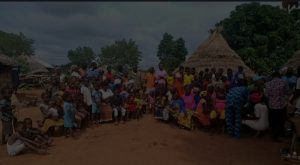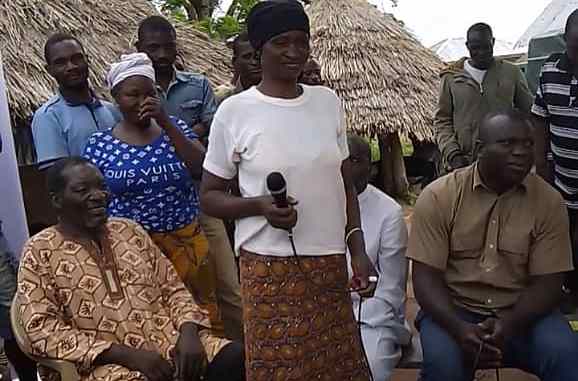Arriving in Soro community one striking thing to notice is the number of pregnant women and little children of same age range milling around. They are villagers from Guma Local Government Area of Benue state and Lobi LGA in Nasarawa State who were chased out of their homes as a results of an unending wave of attacks by herdsmen. For the displaced citizens currently residing in the settlement located near the headquarters of Irepo LGA of Oyo State, the march towards safety and survival has taken them very far away from their hometowns. The desperate search for freedom from the devastation and ravages of herdsmen violence brought them to their current home. Their stories are replete with complaints about the lack of basic amenities to make their lives comfortable.

Houses at the Soro settlement are made of mud with thatched roofs; just a few covered with zinc. The houses were arranged to make space for a ground where the people can gather to hold their meetings or church services whenever the priest is able to reach them. There is no electricity or pipe borne water; neither are there schools or hospitals in sight. Most of the villagers have however taken solace in the fact that they have lands to cultivate crops again, while the women in particular are happy that they can at least feed their children, eat and sleep without fear of being attacked by herdsmen even though herdsmen can be sighted in the community.
These farmers have basically cultivated crops such as rice, yams, tomatoes, cassava and other crops. They stated that though life is still very tough, at least they have peace of mind in their new found home. Many of the women are pregnant including much older women who should have stopped giving birth but the lack of family planning facilities means those past their prime would be nursing mothers soon. Questions about how these women go to hospital for routine check- ups, who takes delivery of their babies, and provide healthcare for other sick children, readily come to mind. Equally interesting to ask is the question about how these citizens manage to live in this settlement with no pipe borne water, no electricity supply, health facility or school for the growing children. These posers formed the core of the issues focused on during a field trip by a team of journalists to the area. The trip was organized by a Non Governmental Organisation (NGO), PAGED Initiative through its programme titled; Report Gender for Inclusive Development (RGID).
The Paged Initiative is known for the screening of a documentary, Uprooted, which is aimed at capturing the voices of the voiceless, particularly those in remote areas who have been displaced from their homes as a result of conflicts. The NGO also creates awareness on the changing gender roles in the society and has been engaged in building awareness and promoting acceptance of women’s changing gender roles among a variety of audiences, including local women and men, civil society organisations, policymakers, media professionals and other stakeholders.
According to Helen Matthew, one of the pregnant women at the settlement, expectant mothers never visit any health facility all through their pregnancy period because there is none available in the settlement. The nearest health facility is located in Kishi town which is about two hours drive, and is difficult to access due to the poor condition of the road.
“The only local birth attendant we have here is Baba Simon’s wife, an elderly woman of over 70 years; she takes delivery of all the children the women give birth to there. She is the most senior wife of their chief Baba Simon,” she said. Baba Simon’s wife has no orthodox experience on midwifery; she had no formal training in the delicate art of taking women’s delivery. She merely acquired her midwifery skills from her grandmother who she grew up. The midwife narrated that she used to watch how her grandmother used to helped many pregnant women back in the days.
“I don’t have any formal education or experience other than the experience gathered while growing up with my grandmother. She passed this gift to me. I only learnt this from grandmother during my growing up years, so many women in my village then did not go to the hospital, and it was mama who helped them during pregnancy.
She continued: “God has been merciful to us, since I have been helping pregnant women no one has died or lost her baby. All I always do is pray before anything and we just put our trust in God for safety and we have been fine. The only difficult situation I ever had, the woman was in labour towards evening and it lasted for a long time, when the baby wasn’t coming forth I told the husband to go look for bike so he can take the wife to the hospital in Kisi.
“It was not easy getting a bike at that time of the night, but I kept praying to God for help and before the woman’s husband could arrive with a bike the woman gave birth. That was the most difficult situation I have faced,” Baba’s wife narrated.
IDP Women and their water needs
Apart from the challenges relating to healthcare, the community also lacks potable water which is a basic necessity of life. There is no sight of a river or any stream except for a pond located a short distance from their mud and thatched roof houses.
“That is a major challenge for us here. As a woman I need water to do many things: drinking, cooking, bathing, washing especially because of our little children,” said Helen Mathew.
“When raining season is over life becomes more difficult. Our only source of water is that small stream; we even share this with cows. We have tried to divide the water since cows share it with us so that at least we can have clean water to drink but each time we do that the cows destroy it whenever the herdsmen take them to drink. Our children fall sick due to intake of unclean water yet there is nothing we can do, but to give them herbs and pray to God who has been so merciful to us for healing.”
Many wives, even more children
The village head Baba Simon alone has four wives and so many children whom he lost count of their number. Some of his grown-up sons also have wives including other men in the community. One of Baba’s sons, 27-year-old Daniel Akwue, told the journalists that, “You can write that we are 30 children. They do not know anything about family planning. They keep giving birth here; 21, 22 children.”
Daniel, who is also married, disclosed that the oldest amongst his siblings was over 40 years old while the youngest was a few months old. He also said many of his siblings are also married and Baba who obviously has a few months old baby is still competing with his sons for bringing forth children, and jokingly said he might marry another wife. The living condition of these children and women is one of the reasons the Paged Initiative took its advocacy down to this community.
Insecurity and the search for solace
During the trip, the villagers were opportune to watch the “Uprooted” documentary which captures the terrorist attacks of some communities in the North-East, and the survival story of victims affected by Boko Haram terrorists. Touched by the story of survivors in the short film, they were moved to share their experiences and predicaments being attacked by herdsmen to the team of journalists, while members of the NGO also took record of their experiences.
The pregnant women, Helen Matthew, got emotional and said, “Our relations were killed, our houses burnt. Those herdsmen destroyed our farm produce and the governor asked them to leave the state and so they started killing our people. I had to run to the capital city in Makurdi. While in Makurdi, there was no help; life wasn’t easy for me there. There was no farm to cultivate and so I had to look for a better place to move on with my life.
“I had to call my people down here and they told me to come. Even when I came, life was still tough. I spoke to Baba Simon who is our chief here and he gave me land to farm. We are trying to settle down fine here. The priest is also helping us a great deal,” she said.
Another woman, Esther James, narrated her own heartbreaking experience. According to her, her husband had died from a snake bite in Benue and she was managing life with her three children – two males and a female – when the attack started. “My two sons were killed. I had to flee from the town with my remaining child, a girl. I can never return to that place because the trauma is too much for me. I don’t want to remember how my two sons were killed,” she said.
For Joshua Shonu, when the attack started, he was among those who found themselves at the internally displace persons camp, but the difficult life in the camp had him seek a better life which made him end up in Soro. He added that though, he would have loved to go back to his village, he had called many of his relations who told him they were still unable to go back to their home town of Guma.
“I was a farmer there, when I arrived here, Baba Simon, gave me a land which I had cultivated. With time, I hope things will be stable for us,” he said.
The ugly security situation in Nigeria has continued to lead many out of their original comfort zones and homes in search of peace; this exposes citizens, particularly women and children, to an unhealthy and hazardous living conditions. This is why survivors are calling on government to intervene particularly in the area of restoring total peace to their communities so that displaced people can go back home. However, the citizens in this settlement who are somewhat comfortable having found a massive fertile land to continue their farming lifestyle wish for some basic amenities to make their lives worth living.























